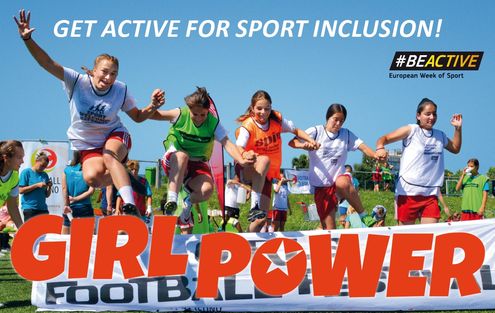All women and girls have the right to equal participation in sports, regardless of their origin. A new study based on focus group research has revealed that as a matter of fact.
When it comes to ensuring that the rights of all women and girls to equal access to social life, leisure activities and recreation are respected, the sports sphere can and must play its part.
But which role do migrant women and girls actually play in European sports? In how far is their equal access ensured? Which barriers exist for those willing to play sports and become involved in a club? Which strategies work with a view to reaching migrant women and girls via sporting activities and ultimately accomplishing their inclusion in a sports club? What recommendations can be given to sports clubs and initiatives on the basis of these findings? These are the main questions the present study aims to answer.
Equal access and barriers in Sports
A new study conducted by Camino as part of the ERASMUS+ project “SPIN Women” relies on the experience of 54 experts, the majority of them women, who met between April and June 2019 in focus groups in seven different countries. They were asked to relate their views and experiences. Focus groups included representatives of sports clubs and initiatives, migrant organizations, further NGOs, sports associations, schools or municipal sports departments. All of the experts had practical experience in dealing with migrant women and girls in a sports context.
The study focuses on newly arrived female migrants, often refugee women and girls. Some focus groups also looked upon members of socially marginalized ethnic minorities, mostly from the Roma community.
The author of the study report, Victoria Schwenzer, concludes: It is (often) a number of barriers that keep migrant women and girls from exercising the right to equal participation in sport. Such barriers exist on various levels: within the structures of organized sports as well as within the structures of the migrants’ families of origin and the larger context of the host society. An intersectional perspective shows that different forms of discrimination tend to concur and reinforce each other.
Furthermore, the study examines the consequences of the arrival of an increased number of refugees beginning in 2015/2016: Clubs, associations and initiatives in several European countries developed a number of sporting activities for this target group. Women and girls were hardly reached. What is more, they were not even perceived as a specific target group. ‘Sporting activities for refugees’ meant sporting activities for (young) male refugees.
However, the study has identified changes. Some of the sports projects for refugees would now attempting to adapt to the special target group of women and girls and specific projects have been initiated. But “a major imbalance” would remain.
Sport Inclusion of Migrant and Minority Women
SPIN Women (Sport Inclusion of Migrant and Minority Women: Promoting sports participation and leadership capacities) is a project of the Sport Inclusion Network (SPIN), co-funded by the Erasmus+ Programme of the European Union.
The following organizations participate in the research project: the Vienna Institute for International Dialogue and Cooperation (VIDC/fairplay) from Austria, sports umbrella organization Liikkukaa – Sport for all from Finland, sports association Unione Italiana Sport Per Tutti (UISP) from Italy, the professional football players’ union SJPF from Portugal, Mahatma Gandhi Human Rights Organization from Hungary, the Football Association of Ireland (FAI) and Camino from Germany, dedicated to social science research and further education (Camino – Werkstatt für Fortbildung, Praxisbegleitung und Forschung im sozialen Bereich gGmbH).
How to get the study report
The hard copy of the 24 pages publication “Equal access and participation of migrant women and girls in sports – A study report” can be ordered from VIDC-fairplay in Austria.
For a hard copy, please send an email with your postal address to fairplay[at]vidc.org
The electronic version can be downloaded here: Equal access and participation of migrant women and girls in sports – A study report

